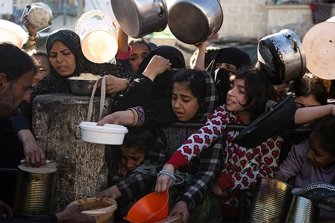HEKS calls for an immediate ceasefire and respect for international humanitarian law
In view of the unprecedented humanitarian catastrophe in the Gaza Strip and reports of famine, an immediate ceasefire and safe access for humanitarian aid are urgently needed for the unconditional protection of the civilian population. HEKS/EPER calls on the Federal Council to support this within the framework of international bodies, in particular the UN Security Council. Further civilian casualties in Israel, Gaza and the occupied territories must be prevented and access to life-saving aid must be guaranteed for all those in need. All civilian hostages must also be released immediately and unconditionally.
The recent order of the International Court of Justice (ICJ) on provisional measures, which points to the real and imminent danger of genocide, shows the urgency of the situation. HEKS/EPER calls on all states, and Switzerland in particular, to continue to work for an immediate and lasting ceasefire in accordance with the provisional measures ordered by the ICJ. Israel's failure to comply with the ICJ's clear order to take "immediate and effective measures" to protect the Palestinians and ensure the delivery of vital humanitarian aid is exacerbating an already difficult situation. There are reports of increasing starvation in the Gaza Strip. HEKS/EPER stresses the need for immediate humanitarian access in order to provide the affected population with the most basic necessities. It appeals for international support in calling for a ceasefire and compliance with international humanitarian law. The urgency of tackling the hunger crisis must be recognised. Transport to Gaza by air or sea should be seen as complementary to land transport and not as a substitute, as it can in no way replace assistance delivered by road.

